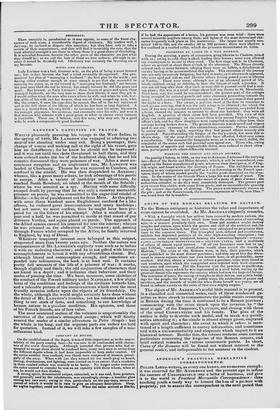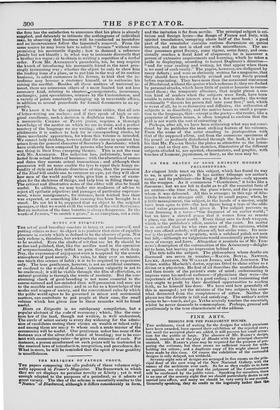ANDERSON'S PRACTICAL MERCANTILE CORRESPONDENCE.
POLITE Letter-writers, as every one knows, are numerous enough : it was reserved for Mr. ANDERSON and the present age to infuse the essence of CHESTERFIELD into a letter of business, and give it to the world in Practical Mercantile Correspondence thus teaching youth a ready way to lament the loss of a pal tner with propriety, yet to assure the correspondent in the next period that the firm has the satisfaction to announce that his place is already supplied, and delicately to intimate the nothingness of individual man, by observing that business will be conducted as heretofore and no inconvenience follow the lamented's removal. From the same source he may learn how to solicit " favours " without com- promising his mercantile dignity ; how to demand a reference plainly but not bluntly ; in what way to insinuate discreetly that a brother is a rogue; or to obtain in writing a repetition of a verbal order. From Mr. ANDERSON'S precedents, too, he may acquire the knack of introducing his mercantile friend in the most pres- singly insinuating way ; whether the object be only to show him the trading lions of a place, or to put him in the way of its routine business, to solicit customers in his favour, to hint that the in- troduce° may become a customer himself, or to authorize his raising the needful. Besides all these matters of universal in- terest, there are numerous others of a more limited but not less necessary kind, relating to charters,consignments, insurances, exchanges, joint speculations, seizures by the Customhouse, and a variety of points constantly springing up in mercantile affairs, in addition to several precedents for formal documents in an ap- pendix. We know it to be the opinion of certain critics, that all arts of letter-writing are useless : and if they speak of high or ori- ginal excellence, such a decision is doubtless true. To become a mercantile CICERO or PLINY junior, requires a thorough knowledge of the matter on which we are to write, and a perfect mastery of the language we are writing; either of which accom- plishments it is useless to look for in corresponding clerks, let alone merchants' apprentices, for whom this volume is intended. We cannot help thinking, however, that the canon in question has arisen from the general character of Secretary's Assistants; which have evidently been composed by persons who have never written any thing in their lives excepting themes. This is not the case with Mr. ANDERSON. His collection has, judiciously, been se- lected from actual letters of business : with the alteration of names and dates they narrate actual transactions ; and although their possession will no more enable the tyro to equal their happy ro- tundity of style and delicate directness of aim, than the possession of the Iliad will enable one to compose an epic, yet they will show how men of the world really write, give him a series of exem- plars for the skeletons of things, and help him in filling them up. The critical and illustrative notes of the editor will also be found useful. In addition, we may tender our modicum of advice to reject all epithetic adjectives and passages of particular empresse- ment, where consignments, for instance, have fetched less than was expected, or something like running has been brought to a stand. Do not let it be supposed that we object to the original passages, or that we would chill the warmth of the civil SEVIGNES. But an imitation of the finer beauties is always dangerous. In the words of J umus, "to snatch a grace," is an exception, not a rule.



























 Previous page
Previous page